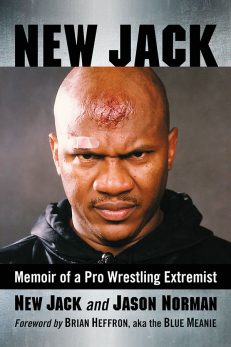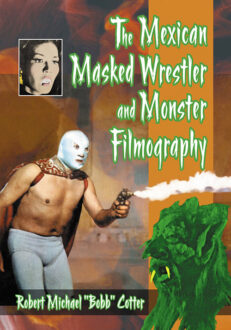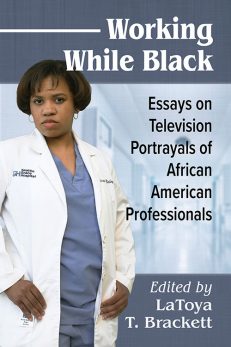Subtotal: $19.99
Working While Black
Essays on Television Portrayals of African American Professionals
$45.00
In stock
About the Book
In recent years, there has been a rise in diverse racial representation on television. In particular, Black characters have become more actualized and have started extending beyond racial stereotypes. In this collection of essays, the representation of Black characters in professionally defined careers is examined. Commentary is also provided on the portrayal of Black people in relation to stereotypes alongside the importance of Black representation on screen. This work also introduces the idea of Black-collar, a category which highlights the Black experience in white-collar jobs. The essays are divided into six parts based on themes, including profession, and focuses on a select number of Black characters on TV since the 1990s.
Instructors considering this book for use in a course may request an examination copy here.
About the Author(s)
Bibliographic Details
Edited by LaToya T. Brackett
Format: softcover (6 x 9)
Pages: 228
Bibliographic Info: notes, bibliography, index
Copyright Date: 2021
pISBN: 978-1-4766-7521-3
eISBN: 978-1-4766-4234-5
Imprint: McFarland
Table of Contents
Acknowledgments xi
Preface: Why Black Professionalisms, Why TV and Why Now? 1
Introduction: Defining Black-Collar Professionalisms 7
Part I—Black Love: Families and Friendships
Battling Impostor Syndrome: Authenticity, Urban Realities and the Black Bourgeoisie in The Fresh Prince of Bel-Air
LaToya T. Brackett 26
ABC’s Black-ish: A Critical Analysis of the Black Professional Parent
Mia L. Anderson 38
Black Brotherhood, Professionalism and Entrepreneurship as Depicted in Martin, The Wayans Bros. and Malcolm & Eddie
David Stamps 47
“I’m glad I got my girls”: Black Women, Working, Friending and Seeking Love in Fox’s Living Single
LaToya T. Brackett 57
Part II—Publicly Figured Characters
Tackling Stereotypes: Portrayals of Black NFL Athletes on The CW’s The Game and HBO’s Ballers
Darnel Degand 70
#IamMaryJane: Blackness, Womanhood and Professionalism in BET’s Being Mary Jane
Malika T. Butler and Kristal Moore Clemons 80
Capital Codes and Money Moves: The Ironies of Professionalism in Empire
Natalie J. Graham 89
Part III—Medical Professionals
Shonda Rhimes’ Grey’s Anatomy and My Year of Saying Yes to Everything
Adelina Mbinjama-Gamatham 100
Sapphires with Stethoscopes: Black Women Practicing Medicine on Television
Phokeng Motsoasele Dailey 110
The Curious Case of the Black Male Doctor: Character Actualization and Moderate Blackness of ER’s Peter Benton
LaToya T. Brackett 121
Part IV—Educators and the Educated
Anti-Blackness and Colorblindness in Post-Cosby Sitcoms: Likeable Black Teachers, Exceptional Black Students but/and Everybody Hates Chris
Amir Asim Gilmore 134
“Dear White People: It truly is A Different World”: Representations of Black Male Faculty in Television Series
Dominick N. Quinney 146
Part V—Policing and Politics
Not So Black and White: Race, Police and Double Standards in The Shield
Saravanan Mani 156
Mammies, Jemimas, Jezebels and Sapphires: Deconstructing Representations of Black Women Coroners on Crime Dramas
Tammie Jenkins 165
Black Woman: High-Powered but Not Balanced in Shondaland
Adelina Mbinjama-Gamatham and Eleda Mbinjama 174
Part VI—New Television
Awkward and Black: Redefining Representations of Black Women on The Misadventures of Awkward Black Girl and Insecure
Regina M. Duthely 186
Behind Their Masks: Complex Black Superheroes on the Small Screen
Christopher Alanye Covington 195
About the Contributors 205
Index 209
Book Reviews & Awards
“This edited collection studies changes in televisual representations of African Americans, particularly in the 1990s. Focusing on that decade is meaningful because although many scholars have written about The Cosby Show and the like, overall scholarship on Black representation on TV in the 1990s is lacking. Here, essays show that the reality of Black characters on TV is more complex than simple stereotypes, as attested to by the presence of African American professionals, including African American educators, medical professionals, and businesspeople. …The essays further touch upon the intersection of African American representation and gender representation. …the essays showcase the experience of being Black and being professionals on television….recommended”—Choice

 Weather Reports from the Autism Front
Weather Reports from the Autism Front 




